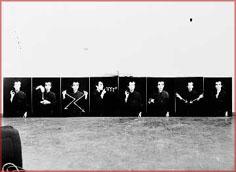Arteast 2000+
dal 26/4/2002 al 26/5/2002
Segnalato da
26/4/2002
Arteast 2000+
ZKM_Center for Art and Media, Karlsruhe
International Collection Arteast 2000+ keeps traveling. The exhibition of the selected works for the international and national collections of Moderna galerija, entitled The Art of Eastern Europe, will be presented in ZKM (Zentrum für Kunst und Medientechnologie) in Karlsruhe.

Art from Eastern Europe.
Selected Works from the Collection of the Moderna Galerija in Ljubljana, Slovenia
Exhibition curators: Badovinac Zdenka, Weibel Peter
International Collection Arteast 2000+ keeps traveling
The exhibition of the selected works for the international and national
collections of Moderna galerija, entitled The Art of Eastern Europe, will be
presented in ZKM (Zentrum für Kunst und Medientechnologie) in Karlsruhe
(Germany), Foyer Kubus, 28 April - 26 May 2002
Concept
Moderna galerija (Museum of Modern Art) Ljubljana began to assemble its
international collection Arteast 2000+ in the nineties, a time following
major local and political changes. The purpose of the collection is manifold:
constituting works mainly by Eastern European artists, it means that the
Museum of Modern Art has created a new dimension to its activities, i.e. it
wishes to present Eastern European art, which has been overlooked until now,
to establish a dialogue between Eastern and Western European artists and in
this way create a new, different view on the development of art in the second
half of the twentieth century.
For a long time Eastern European art after the Second World War was
completely identified with the official aesthetics of socialist realism.
However, when the world started to take a greater interest in Eastern
European art, as a consequence of the political changes in the last ten
years, the East began to feel the need for a re-evaluation of its history.
Those artists who have already attracted the attention of the international
public are almost exclusively heirs to classic avant-garde movements and, as
such, are representatives of conceptual art. The aesthetic of their work does
not follow the maxims of conventional media and continues the legacy of
conceptualism developed in the early 20th century by one of the most
important 20th century artists, Marcel Duchamp. The simplest definition of
conceptualism refers to works which give precedence to the artist's idea over
the object as such. This definition gave rise to a broad variety of art
practices based on new media which developed in the 1960s: performance, video
art, installations, and the like. For more than 15 years these new forms of
conceptualism have dominated major art exhibitions all over the world.
Because this art was consistently provocative and socially critical in the
East, it is not surprising that official histories bypassed and excluded it
from official collections. Moreover, they even directly opposed it, so that
it could develop only as a marginal and unofficial practice. Given the right
conditions, it could win general recognition in international circles; this
has already been proved by individual Eastern European artists who, with
considerable personal effort and without any outside help, have emerged as
some of the greatest stars of the international art scene. The international
collection is based on the works of artists who already have international
references. These are combined with other works, also interesting and of high
quality, by still unrecognised authors, who represent a real revelation to
the international art world.
The Arteast 2000+ collection is not only a museum collection in the sense of
already established history but a collection in the sense of a space in the
museum as a laboratory, revealing and developing different contexts in which
contemporary art is being created. The Arteast 2000+ collection not only
follows the norms of globalisation but also offers its own form of
globalisation. This, of course, is the most effective way to become an equal
part of the world as a global unit.
Opening: Saturday, 27 April 2002 at 5 p.m.
more information on the artists on http://www.2000p.org
Image: a work of Albert Jury
The same exhibition was shown in Orangerie Congress Innsbruck in November
ZKM
Zentrum für Kunst und
Medientechnologie, Karlsruhe, Foyer Kubus



